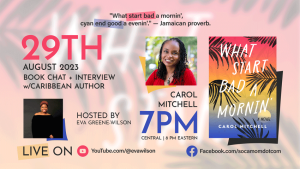This column by Martin Daly celebrating the contributions of Trinidad and Tobago’s performing arts appeared in The Express. Without the massive contribution of the performing arts, the celebrations for the 50th anniversary of Independence would have been considerably lacking. This is ironic because the current Government’s attitude to the performing arts is as patronising and as policy-less as that of its predecessors.
I sat on the pavement’s edge on Tragarete Road on Independence morning 2012, soaking in ordinary Trinbago at its best, meeting and making good company within a living embodiment of 3Canal’s Morning Neighbour, in the warm embrace of Invaders’ breakfast sale and later at the first of the Playboyz’ entertainment spectaculars. I reflected again on the congenital inability of our “part time lovers” of popular culture—sincerely to appreciate the richness of what we have, whatever cunning words fall from their spin-laden lips. It has taken me a week to digest the brilliance of the experience. The second of Playboyz productions was a street show with five stages stretching from Cipriani Boulevard to French Street, proving that a small yard could produce a big show. The leadership of Brian Kuei Tung was formidable. His project took a cultural presentation to the proverbial different level. The next day, I read the republication of what Derek Walcott wrote in the Independence supplement of the Sunday Guardian of August 26, 1962, entitled “The Prospects Of A National Theatre”.
Although describing himself “as a St Lucian writer”, Walcott is positive in his assessment of the cultural richness of Trinidad. “This is a nation which celebrates with more artistic expression on a popular level than probably anywhere else in the world”. Although Walcott made this assessment 50 years ago, I submit that his summation has remained unwaveringly true of us to this day. It can hardly be contradicted that we lived every word of it during August 2012. Even the military parade on Independence morning is a popular artistic expression. Once the services involved in the parade leave the jacketed and culturally tied confines of the official parade ground, their demeanour changes and there is a lilt in the step of the march past; and so it should be since the march music is calypso/soca.
There are sometimes sneering references to indigenous popular culture. These may be provoked by the more extreme manifestations of “ben’ over and wine “, what the Bajan’s call “wukking up”. Discerning commentators however understand the role of popular culture in our society. In his assessment of 50 years ago Walcott also wrote this of Trinidad and Tobago: “It is a nation of any number of popular poets, the only nation which has a spontaneous national festival of language and music, the only nation which is not faking its ballad tradition, its freedom of artistic and popular satire. The only nation with so much exuberant genius within the archipelago, and the only nation that has done nothing for the arts because the arts are too available.” Other high-powered commentators have analysed the elements of play within our performing arts and have concluded that some of our play is fundamentally serious and constitutes resistance to the authoritarian streaks in the political cultures which seek to dominate us. See Culture in Action-The Trinidad experience edited by Professor MillaCozartRiggio of Trinity College, Connecticut.
Fifty years later our genius has lost neither its exuberance nor its resistance. Our performing arts have survived, not all in the same shape or form, but just as vibrant and inventive. If you doubt my assertion that we are still inventive go and hear the National Steel Symphony Orchestra under the baton of Jessel Murray using the G Pan and PHI, these instruments slowly gaining the respect of the pan movement now that they are no longer instruments of political braggadocio and preference. Indoor theatre at all points between Miss Miles and the comedies of Choo Kong and Ragoobarsingh is in bloom. Nevertheless fifty years later we still lack the National Theatre of which Walcott wrote. The Trinidad Theatre Workshop was itself a victim of governmental eviction from Hart Street. I do not know the full story of its relocation to 23 Jerningham Avenue but I have visited the space.
The premises are frail, funds are few, but whatever the history the creative spirit lives. Yes, the relevant ministries do help fund the performing arts but it is so ad hoc, so much of a begging job. There are also enlightened and faithful sponsors but not nearly as many as we need. Meanwhile, there on the streets, like many others, I reaffirmed my independence from the grasp of officialdom. God spare life, as they say, I plan to stay out there, sitting on the pavement edge, chipping in the yard and, indoors and out, taking in all the vibrant genius, loving it all the way, eh Black Stalin.This is where a large part of the real Trinbago resides. I am proud and privileged to describe it.
For the original report go to http://www.trinidadexpress.com/commentaries/Resisting_the_part-time_lovers-169065426.html
Read more http://repeatingislands.com/2012/09/12/resisting-the-part-time-lovers-trinidads-performing-arts/



